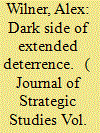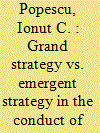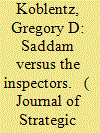| Srl | Item |
| 1 |
ID:
157894


|
|
|
|
|
| Summary/Abstract |
States employ extended deterrence to shield third parties from aggression. The concept is traditionally applied to interstate relations, collective security arrangements, and strategic considerations. The protective relationship that exists between a state sponsor of terrorism and its non-state militant proxy is rarely considered. This article will introduce and explore the sponsor–proxy relationship in the context of extended deterrence, and relate it to Iran’s support and sponsorship of political violence, militancy, and terrorism in Europe. The article reviews the rationale states have for sponsoring terrorism, and illustrates the promises and pitfalls associated with extending deterrence to non-state militants.
|
|
|
|
|
|
|
|
|
|
|
|
|
|
|
|
| 2 |
ID:
157895


|
|
|
|
|
| Summary/Abstract |
Does a great power need to formulate a long-term Grand Strategy to guide its foreign policy actions? While some scholars continue to debate the competing merits of various grand strategies, a growing literature now emphasizes emergent learning and improvisation as the keys to success, as opposed to implementing a long-term design. In this article, I explore these scholarly arguments by framing the debate as one between two schools of thought, Grand Strategy and Emergent Strategy. After presenting the main arguments and the historical examples associated with each school, I evaluate the two approaches across four categories: the type of international security environment each of them is most suited for, the way each approach deals with short-term vs. long-term priorities, the domestic political conditions needed for each approach to be successful, and the type of presidential management qualities each school demands. Lastly, I discuss the implications of these arguments for the scholarship and the practice of foreign policy and national security strategy.
|
|
|
|
|
|
|
|
|
|
|
|
|
|
|
|
| 3 |
ID:
157892


|
|
|
|
|
| Summary/Abstract |
The special operations forces (SOF) of the industrial democracies have suddenly and rapidly grown in numbers and resources during the past decades. Most explanations for this growth focus on factors external to the armed forces. We argue that the enlargement of SOF is also the result of internal organizational dynamics. First, we compare SOF to other units and military appendages that have grown over the past 30 years in order to delineate what is unique to their development and the special adaptive potential they bring to the armed forces: generalized specialization, boundary spanning roles, and enlargement of military autonomy. Second, we analyze the actions of internal military entrepreneurs and their organizational mentors to show how they use this adaptive potential to “sell” the use of SOF to key policy-makers and decision-makers.
|
|
|
|
|
|
|
|
|
|
|
|
|
|
|
|
| 4 |
ID:
157893


|
|
|
|
|
| Summary/Abstract |
The discovery that Iraq had no weapons of mass destruction (WMD) in 2003 raised the question of why Saddam had prevented UN weapons inspectors from fully accounting for his disarmament. The leading explanation for Saddam’s behavior is that he valued ambiguity as part of a strategy of ‘deterrence by doubt’. This article argues that Iraq’s obstruction of inspectors in the late 1990s was motivated by his desire to shield Iraq’s regime security apparatus from UNSCOM’s intrusive counter-concealment inspections. The failure to understand how strongly Saddam’s concerns about his personal safety drove Iraq’s contentious relationship with UNSCOM set the stage for the invasion of Iraq in 2003.
|
|
|
|
|
|
|
|
|
|
|
|
|
|
|
|
| 5 |
ID:
157896


|
|
|
|
|
| Summary/Abstract |
The present-day conflict in Yemen is a valuable case study in the coercive use of airpower. The Saudi-led bombing campaign demonstrates the challenges inherent in applying a punishment-based strategy in a civil war, where coercive mechanisms operate differently than in interstate conflict. The audit from Yemen vindicates the effectiveness of a denial-based strategy and offers insights on the relative utility of interdiction and close air support in advancing that strategy. This examination dissects the campaign, assesses its effectiveness, and extracts insights useful both to the analysis of similar conflicts and to the evaluation of U.S. foreign policy alternatives.
|
|
|
|
|
|
|
|
|
|
|
|
|
|
|
|